Search Posts
Recent Posts
- In the News… quick recap of the week’s news 6.21.25 June 21, 2025
- Providence Art Club Prestigious National Open Juried Exhibition Begins June 21, 2025
- Burn with Kearns: “30-day Shreds” Fail the 50+ Market. What To Do. – Kevin Kearns June 21, 2025
- Rhode Island Weekend Weather for June 21/22, 2025 – Jack Donnelly June 21, 2025
- Assault Weapons Ban Passes RI Legislature — Now to Governor, Then Courts June 21, 2025
Categories
Subscribe!
Thanks for subscribing! Please check your email for further instructions.
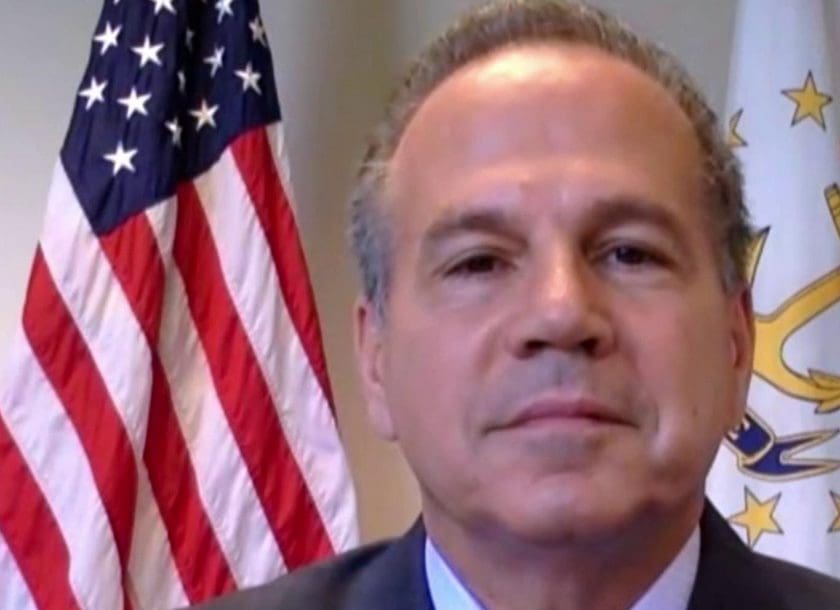
Congressman Cicilline poised for legacy as next fiery advocate on aging – Herb Weiss
Picking Up the Mantle of Fiery Aging Advocate, Claude Pepper – Cicilline Moves to Re-Establish the House Permanent Select Committee on Aging
By Herb Weiss, contributing writer on aging issues
Congressman David Cicilline is poised to offer a resolution to re-establish the House Permanent Select Committee on Aging, whose work came to an end in early January 1993, at the conclusion of the 102nd Congress.
The Washington, DC-based Leadership Council of Aging Organizations (LCAO), a coalition of 69 aging organization, has recently called on the House to support Cicilline’s measure when introduced, “which focuses on the well-being of America’s older population and is committed to representing their interests in the policy-making arena”.
“Now is the opportune time to reestablish the House Aging Committee,” says LCAO Chair, Max Richtman, who serves as President and CEO of the National Committee to Protect Social Security and Medicare (NCPSSM), in an endorsement letter sent to the Rhode Island Congressman on March 30, 2021, detailing the graying of America.
“Every day, 12,000 Americans turn 60. By 2030, nearly 75 million people in the U.S.—or 20 percent of the country—will be age 65 or older. As America grows older, the need for support and services provided under programs like Social Security, SSI, Medicare, Medicaid and the Older Americans Act also increases,” he said, stressing the importance of this select committee.
The resolution to approve the House Aging Committee was passed on October 8, 1974, by a 299–44 margin in the House. Its legislative duties expired during the 103rd Congress, as the House leadership was under pressure to reduce its internal costs and to streamline the legislative process. Initially, the House panel had 35 members, but would later grow to 65 members.
Those opposing reauthorizing the House Aging Committee would say that its elimination would slash wasteful spending, after all, the chamber already had 12 standing committees with jurisdiction over aging issues. On the other hand, advocates warned that the staff of these committees did not have time to broadly examine aging issues as the select committee did.
In a March 31, 1993 article published in the St. Petersburg Times, reporter Rebecca H. Patterson reported that Staff Director Brian Lutz, of the Committee’s Subcommittee on Retirement Income and Employment, stated that “during its 18 years of existence the House Aging Committee had been responsible for about 1,000 hearings and reports.”
The Fourth Time “Hopefully” is the Charm…
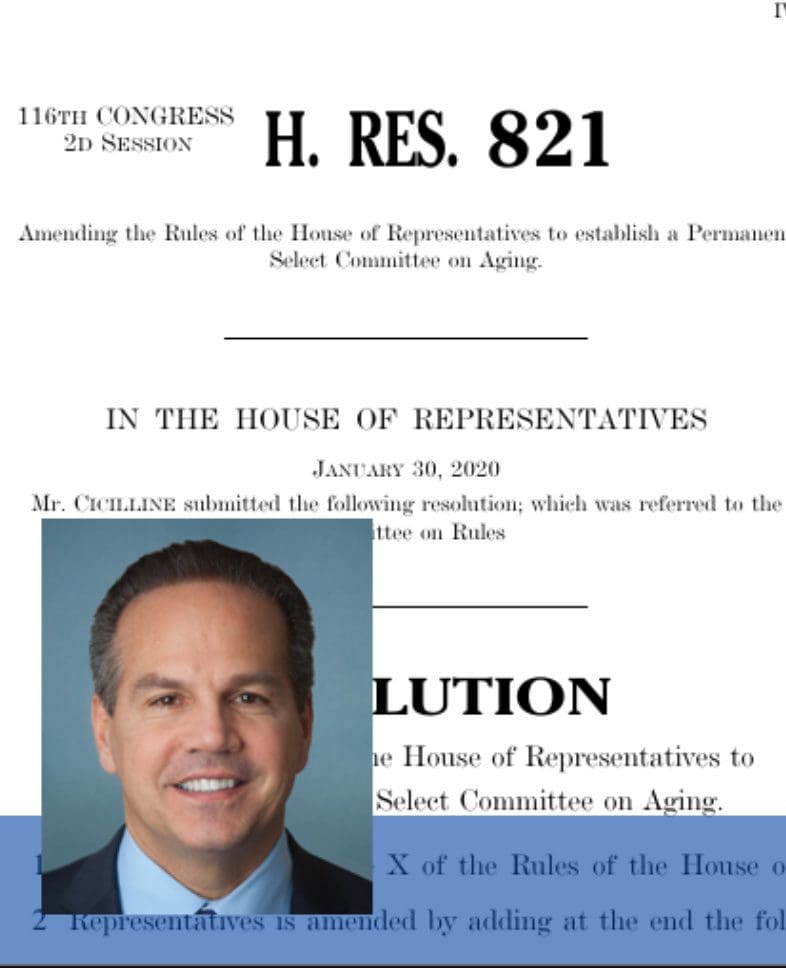
Over 28 years after the House Democratic Leadership’s belt-tightening efforts to save $1.5 million resulted in the termination of the House Aging Committee, Rhode Island Congressman David N. Cicilline is poised to reintroduce legislation to reestablish the House Aging panel, active from 1974 until 1993.
More than five years ago, Cicilline had introduced House Res. 758 during the 114th Congress to reestablish the House Aging Committee. Rhode Island Congressman Langevin and 27 Democratic lawmakers out of 435 House members became cosponsors. But it caught the eye of the co-chairs of the Seniors Task Force (later renamed the House Democratic Caucus Task Force on Aging & Families), Congresswomen Doris Matsui (D-CA) and Jan Schakowsky (D-IL). The lawmakers also signed onto supporting this resolution.
Correspondence penned by Cicilline urged House Speaker Paul Ryan (R-WI) and House GOP leadership to support House Resolution 758. Ultimately, Ryan blocked the resolution from being considered and no legislative action was taken in the GOP-controlled House chamber.
With House Speaker Ryan still retaining the control of the House during the 115th Congress, Cicilline’s H. Res.160 would not gain traction. At that time only 27 Democratic lawmakers stepped forward to become cosponsors, the resolution attracting no support from House GOP lawmakers.
For the third time, during the 116th Congress, Cicilline would again introduce H. Res. 821 to reestablish the House Aging Committee. Even with the Democrats retaking the House and House Speaker Nancy Pelosi taking control of the chamber’s legislative agenda, the resolution would not get a committee vote, again blocking it from reaching the floor for a vote.
During the 117th Congress, Cicilline is not taking “no” for an answer, and continues his push to bring back the House Aging Committee. Once his resolution is thrown into the legislative hopper, it will be referred to the House Committee on Rules for mark-up and if passed will be considered by the full House. It’s expected to be just 245 words like the previous ones introduced during the last three Congresses.
The Resolution: Short and Sweet
Cicilline’s resolution would reestablish a House Aging Committee without having legislative jurisdiction, this being no different than when the select committee previously existed. It would be authorized to conduct a continuing comprehensive study and review of aging issues, such as income maintenance, poverty, housing, health (including medical research), welfare, employment, education, recreation, and long-term care. These efforts impacted legislation taken up by standing committees.
According to the Congressional Research Service, it is relatively simple to create an ad hoc (temporary) select committee by approving a simple resolution that contains language establishing the committee—giving a purpose, defining membership, and detailing other issues that need to be address. Salaries and expenses of standing committees, special and select, are authorized through the Legislative Branch Appropriations bill.
This resolution would also authorize the House Aging Committee to study the use of all practicable means and methods of encouraging the development of public and private programs and policies which will assist seniors in taking a full part in national life and which will encourage the utilization of the knowledge, skills, special aptitudes, and abilities of seniors to contribute to a better quality of life for all Americans.
It would also allow the House Aging Committee to develop policies that would encourage the coordination of both governmental and private programs designed to deal with problems of aging and to review any recommendations made by the President or by the White House Conference on Aging in relation to programs or policies affecting seniors.
“After a lifetime of working hard and playing by the rules, Rhode Island seniors should be able to enjoy their retirement years with dignity and peace of mind. Re-establishing the House Aging Committee will help make this goal a reality. From protecting Social Security and Medicare to lower the costs of housing and prescription drugs, this Committee will help ensure we can deliver better results for seniors here in Rhode Island and across America,” says Cicilline.
Looking Back
According to NCPSSM’s Richtman, who served as staff director for the Senate Special Committee on Aging from 1987 to 1989, the House Aging Committee historically served as a select committee that fostered bipartisan debate from various political and philosophical viewpoints to promote political consensus that, in turn, impacted the legislation that was taken up in authorizing committees. This select committee would have an opportunity to more fully explore a range of aging issues and innovations that cross Committee jurisdiction, while holding field hearings, convening remote hearings, engaging communities and promoting understanding and dialogue.
While seeing the value of the House Aging Committee, Richtman speculates that regardless of which party is in the majority, the challenge of re-establishing the select committee is that the Legislative Branch appropriation would require that existing House standing committees forgo some funding and staff to create a budget and staff for the Aging Committee. Given that the Aging Committee could have no legislative jurisdiction; the authorizing committees would not lose legislative power.
Robert Blancato, president of Matz, Blancato, and Associates, who was the longest-serving staff person on the original House Aging Committee, from 1977 to 1993, sees the need to bring back the House Aging Committee. “It provided a deeper examination of issues affecting older adults through hearings, investigations, and reports. Every member of the committee was also a member of a standing committee and could take their expertise to into that work,” he noted.
Blancato, who served with three chairs — Will Randall (D-MO), Claude Pepper (D-FL) and Edward Roybal (D-CA), warns that a “floodgate problem” may well derail Cicilline’s efforts to get his resolution passed. “You create one and there will be pressure to create more,” says Blancato. But, bringing back the House Aging Committee is extremely important because there is no “stated expertise in any current standing committee [to investigate] on aging issues,” he adds.
America’s aging population warrants reestablishing the House Aging Committee, says Professor Fernando Torres-Gil, M.S.W., Ph.D., Social Welfare and Public Policy Director, Center for Policy Research on Aging at the UCLA Luskin School of Public Affairs. “By 2029, all 80-plus individuals born between l946 and l964 will be 65 years of age and over. These so-called “aging baby boomers” will create challenges and opportunities that the Congress must examine, understand and respond to with legislation, oversight and partnerships with government, stakeholders and advocates,” says Torres Gill, who served as the select committee’s staff director from 1985 to 1987.
Under the Chairmanship of Congressmen Roybal and the partnership with the ranking minority member, Congressman Rinaldi (R-TX), Torres-Gil saw first-hand the tremendous influence that this select committee had on influencing and motivating House members to promote thoughtful responses to the needs of older Americans, “It served as one of the few venues for bi-partisanship and long-term planning on complex issues facing older persons,” he stated.
According to Torres-Gil, the complexities of an aging society will increase given the pandemic, the growing voices of immigrants, ethnic and minority groups and the challenges for ensuring the financial viability of legacy entitlement programs: Social Security, Medicare, Medicaid, the Older Americans Act. “Now is the time to bring back this vital congressional “thought leader” on legislative action for the aging and diversity of the United States,” he says.
To illustrate the importance of the House Aging Committee, Bill Benson, Staff Director of the Committee’s Subcommittee on Housing and Consumer Interests from 1987 to 1990, (chaired by Congressmen Don Bonker (D-WA) and later James Florio (D-NJ), points to his subcommittee’s work on housing issues. “Both before, during, and after my tenure with the subcommittee, we were able to dig deeply into a multitude of significant housing-related programs and problems facing older Americans. During my tenure alone we conducted at least a dozen hearings just on housing, addressing affordability, quality and appropriateness, contributing significantly to legislative action,” he said.
“I am certain that in just that over two-year period we held far more hearings on housing and aging than have been conducted, in total, in the nearly three decades since. During this interum, there has been almost no congressional attention to housing for the elderly. It is no surprise that today we see homelessness among older adults increasing rapidly, among many other housing problems facing older Americans,” adds Benson, stressing that resurrecting the House Aging Committee is crucial to housing policy for the elderly, along with so many other crucial issues.
The Amazing Legacy of Fiery Senior Advocate Claude Pepper
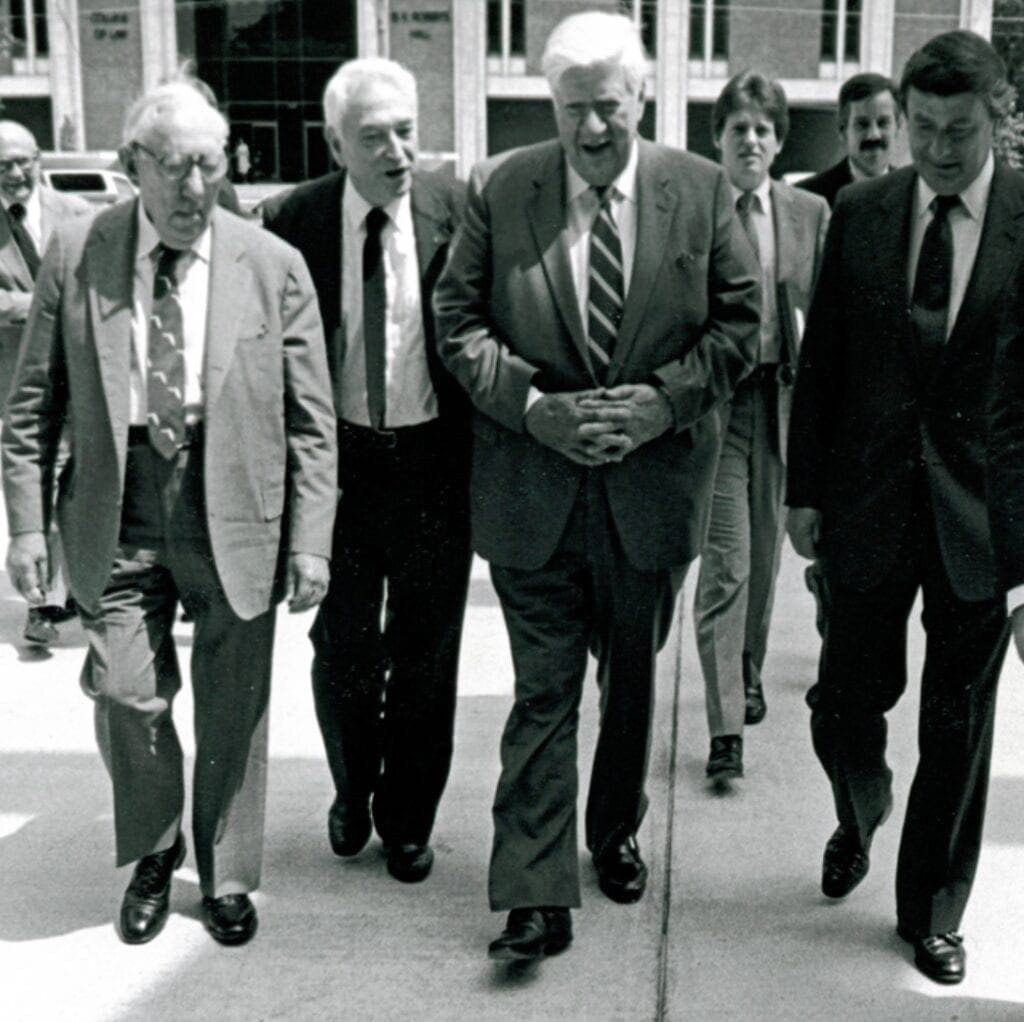
Kathleen Gardner served as Claude Pepper’s staff director of the Subcommittee on Aging and Long-Term Care, from 1984 until his death in 1989, and continued to serve Pepper’s successor, Edward Roybal, until the House Aging Committee was abolished. She was the last surviving member of the Subcommittee, boxing up and archiving its papers for delivery to the Tallahassee, Florida-based Claude Pepper Foundation.
According to Gardner, few know that it was Pepper who was largely responsible for sponsoring or cosponsoring legislation to establish the majority of the Institutes of Health (including the National Heart and Cancer Institutes, the Deafness and Arthritis Institutes, the National Institute of Mental Health and six other Institutes). “One of his last legislative improvements to the National Institutes of Health was the establishment of the National Center for Biotechnology Information at the National Library of Medicine – without which the mapping of the human genome – which will unlock so many of the mysteries of disease — would not have been possible, she adds.
Between 1982 to 1990, Melanie Modlin served as a Professional Staff Member for the full Committee and ultimately became Gardner’s Deputy Director for the Subcommittee on Health and Long-Term Care. She remembered how the House Aging Committee investigated “Diploma mills,” by setting up its own diploma mill, then a phony accreditation to give the investigators credence. The select committee also held one of the first hearings on Alzheimer’s disease, which was just beginning to become a household word.
Modlin recalled that her Subcommittee was tasked with creating a universal health care bill. “Once more, Pepper and the House Aging Committee was a step ahead of the curve,” she says, noting that this debate has come back to Congress.
As newspapers in communities across the nation curtail or jettison their investigative teams, the House Aging Committee has a proven track record and reputation of investigating aging issues is a sound reason as to why the Select committee should be reactivated, says Modlin, especially with the rapid growth of America’s aging population.
Robert S. Weiner, President, Robert Weiner Associates News, who was a close friend and confidant of Pepper, clearly knew the importance and impact of Pepper’s House Aging Committee on the daily quality of life of seniors. Weiner, who served as Staff Director for the Subcommittee on Health and Long-term care from 1975 to 1977 and Chief of Staff of the full Aging Committee, from 1976 to 1980, remembered, “I was thunderbolt struck when [GOP House Speaker] Newt Gingrich abolished the Aging Committee – the Senate wisely kept theirs.”
“Congressman Claude Pepper used the House Aging Committee as a force for the elderly. Bringing it back would be of immeasurable help regardless of which party has the White House in assuring the best health care programs possible, stopping any raiding of the Social Security Trust Fund, and protecting seniors,” says Weiner.
The House Aging Committee prodded Congress to act in abolishing forced retirement, investigating nursing home abuses, monitoring breast screening for older women, improving elderly housing, and bringing attention to elder abuse by publishing a number of reports, including “Elder Abuse: An Examination of a Hidden Problem and Elder Abuse: A National Disgrace,” and “Elder Abuse: A Decade of Shame and Inaction.” The Committee’s work would also lead to increased home care benefits for the aging and establishing research and care centers for Alzheimer’s Disease.
“One of the best known aging accomplishments of Claude Pepper was to end mandatory retirement by amending the Age Discrimination provision in the Employment Act, remembered Weiner, noting that this would get him the cover of Time Magazine with the tag line the “Spokesman for the Elderly.”
Kentucky Fried Chicken King makes his mark

It was Pepper’s idea to bring in Col. Harland Sanders as a witness. Many still remember the 81-year-old Kentucky Fried Chicken King, wearing his trademark spotless white suit and black string tie, and testifying against mandatory retirement in federal jobs,” said Weiner, noting that a few years later it would end up also in the private sector, and the bill would pass 359 to 2 in the House and 89 to 10 in the Senate, with President Carter signing the bill despite strong opposition of the Business Roundtable and big labor, he said.
Weiner also noted that among the House Aging Committee’s other accomplishments under Pepper’s Chairmanship was legislation creating standards for supplemental insurance and holding hearings to expose cancer insurance duplication. “Witnesses were literally forced to wear paper bags over their heads to avoid harassment by the insurance companies. That legislation became law,” he said.
As a long-time Washington insider, Weiner sees the best avenue of bringing the House Aging Committee back from the dead is to get House Speaker Nancy Pelosi (D-CA) and her leadership team, Congressmen Steny Hoyer (D-MD and James E. Clyburn (D-SC), to support Cicilline’s resolution. “It’s not just a matter of ‘getting them to say ok – it’s using the right way to do it that works. While you can get groups to support your efforts to bring back the House Aging Committee, you must verbally make the case to House leadership,” says Weiner. Looking back, “that’s how Pepper always did it – he’d pull people to a place on the floor and talk with them.”
“If he gets those three, or even one or two, and they tell the other two – done deal – it goes to the floor of the caucus for a vote,” notes Weiner.

In Summary…
Over thirty years after the death of Claude Pepper (D-FL) in 1989, no national advocate has emerged to take the place of the former Chairman of the House Aging Committee, who served as its chair for six years. As a result, House Democratic lawmakers and aging advocates are forced every new session of Congress to fend off proposals to cut aging programs, Social Security, and Medicare.
Gardner believes that Cicilline’s efforts to reestablish this needed Select Committee would be a salute to Pepper, the nation’s most visible spokesperson for seniors, and more importantly to his desire to establish a “legislative voice” for our nation’s most vulnerable population – our senior citizens.”
Hopefully House Speaker Nancy Pelosi will agree with Gardner’s assessment. If only for the sake of the nation’s seniors.
For details about the Claude Pepper Foundation, go to https://claudepepperfoundation.org/about/claude-pepper-center/.
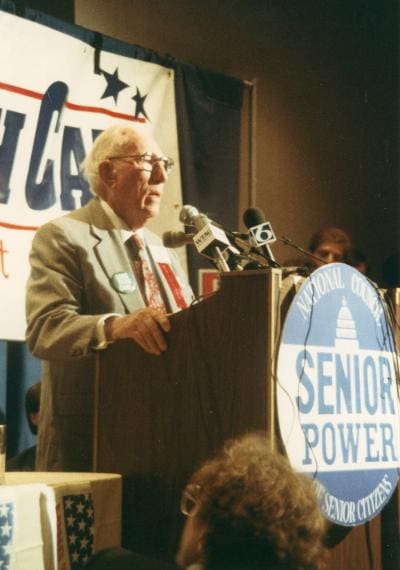
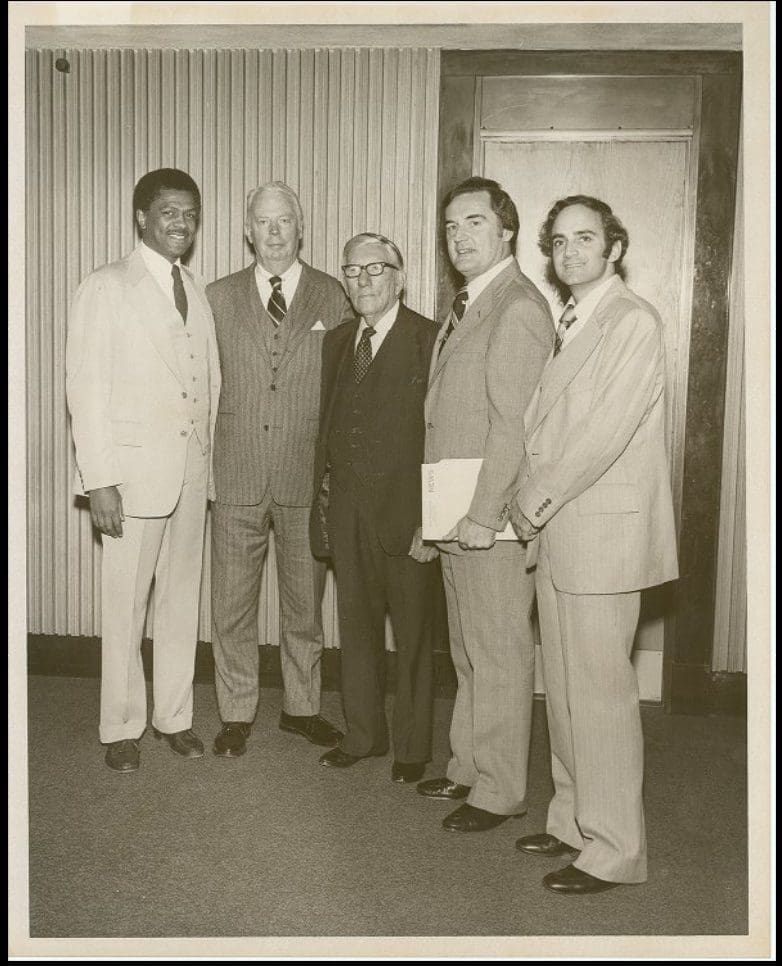

_____

Herb Weiss, LRI ’12, is a Pawtucket covering aging, healthcare, and medical issues. To purchase Taking Charge: Collected Stories on Aging Boldly, a collection of 79 of his weekly commentaries, go to herbweiss.com.

OMG-Really this congressman.. is such a phony-C’mon man!
OMG — Frank…Give the Congressman credit for looking for ways to create a sound aging policy and creating a way to bring the GOP and Democrats together to craft good legislation that will enhance the life of Older Americans.